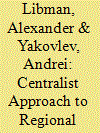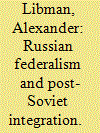|
|
|
Sort Order |
|
|
|
Items / Page
|
|
|
|
|
|
|
| Srl | Item |
| 1 |
ID:
180478


|
|
|
|
|
| Summary/Abstract |
Since 2012, with a view to strengthen the development of strategically important regions, Russia has established several federal agencies responsible for these territories. The essay investigates one of these agencies: the Ministry for the Development of the Far East (Ministerstvo Rossiiskoi Federatsii po razvitiyu Dal’nego Vostoka). We identify two main trade-offs associated with the governance approach used in Russia—between federal power and local knowledge, and between bureaucratic expertise and novel ideas—and examine how the ministry has dealt with these trade-offs and their consequences for the ministry’s performance.
|
|
|
|
|
|
|
|
|
|
|
|
|
|
|
|
| 2 |
ID:
188296


|
|
|
|
|
| Summary/Abstract |
A widespread argument in regionalism studies is that elite narratives are crucial for strengthening regional integration projects. The essay shows that this conjecture does not hold in the case of Eurasian regionalism. Russian elites demonstrate a very high level of rhetorical commitment to regionalism. However, Russia’s rhetoric is characterised by a permanent dissonance. Officially, Russian elites highlight the equality of all participants in regional arrangements and respect for their sovereignty. At the same time, Russian politicians and bureaucrats regularly make imperialist statements to placate domestic audiences. As a result, most framings of Eurasian regionalism that can be derived from Russian discourses are highly unappealing to other post-Soviet states.
|
|
|
|
|
|
|
|
|
|
|
|
|
|
|
|
| 3 |
ID:
161718


|
|
|
|
|
| Summary/Abstract |
This article investigates whether and how regional international organizations created by authoritarian countries can aid the regime survival of their member states. Numerous regions of the world have witnessed a proliferation of regional organizations established by powerful authoritarian states. We argue that the external influence of these organizations can affect regime survival and reinforce non-democratic regime trajectories, but in a nuanced manner. The article argues that, in addition to examining the impact of the regional organization itself, one must examine how the existence of these regional organizations changes the strategy of autocratic leading states, which—in bilateral relations with other countries—could become more eager to support authoritarian regimes of geopolitical importance. We use the case of the Eurasian Economic Union to explore various strategies of Russia, the leading state, vis-à-vis post-Soviet Eurasian countries. These strategies, however, appear only to matter for authoritarian consolidation when countries, from the Russian point of view, are on the ‘front line’ of geopolitical competition with the EU, and which are, therefore, important in stabilizing Russian influence. The article identifies five strategic foreign policy models of leading states which are determined by the existence of regional organizations and evaluates the benefits of these strategies for both leading and targeted states.
|
|
|
|
|
|
|
|
|
|
|
|
|
|
|
|
| 4 |
ID:
107050


|
|
|
|
|
| Publication |
2011.
|
| Summary/Abstract |
The article compares the development of two institutional systems organising intergovernmental relations in the former Soviet Union: Russian federalism and post-Soviet regional integration. Despite the common origins of these two sets of institutions, and the common developmental trends they experienced over the first decade of their existence, the two systems diverged significantly in the 2000s. The article discusses the driving forces behind these differences. It also addresses various forms of direct links between centralisation in Russia and regional integration in the post-Soviet space; these include cross-border cooperation, policy spillovers and perceptions of decentralisation by national elites.
|
|
|
|
|
|
|
|
|
|
|
|
|
|
|
|
| 5 |
ID:
180817


|
|
|
|
|
| Summary/Abstract |
We contribute to research on the democratic role of middle classes. Our paper distinguishes between middle classes emerging autonomously during gradual capitalist development and those fabricated rapidly as part of state-led modernization. To make the case for a conceptual distinction between these groups within one national setting, we employ author-assembled historical district data, survey, and archival materials for pre-Revolutionary Russia and its feudal estates. Our analysis reveals that the bourgeois estate of meshchane covaries with post-communist democratic competitiveness and media freedoms, our proxies of regional democratic variations. We propose two causal pathways explaining the puzzling persistence of social structure despite the Bolsheviks’ leveling ideology and post-communist autocratic consolidation: (a) processes at the juncture of familial channels of human capital transmission and the revolutionaries’ modernization drive and (b) entrepreneurial value transmission outside of state policy. Our findings help refine recent work on political regime orientations of public-sector-dependent societies subjected to authoritarian modernization.
|
|
|
|
|
|
|
|
|
|
|
|
|
|
|
|
|
|
|
|
|